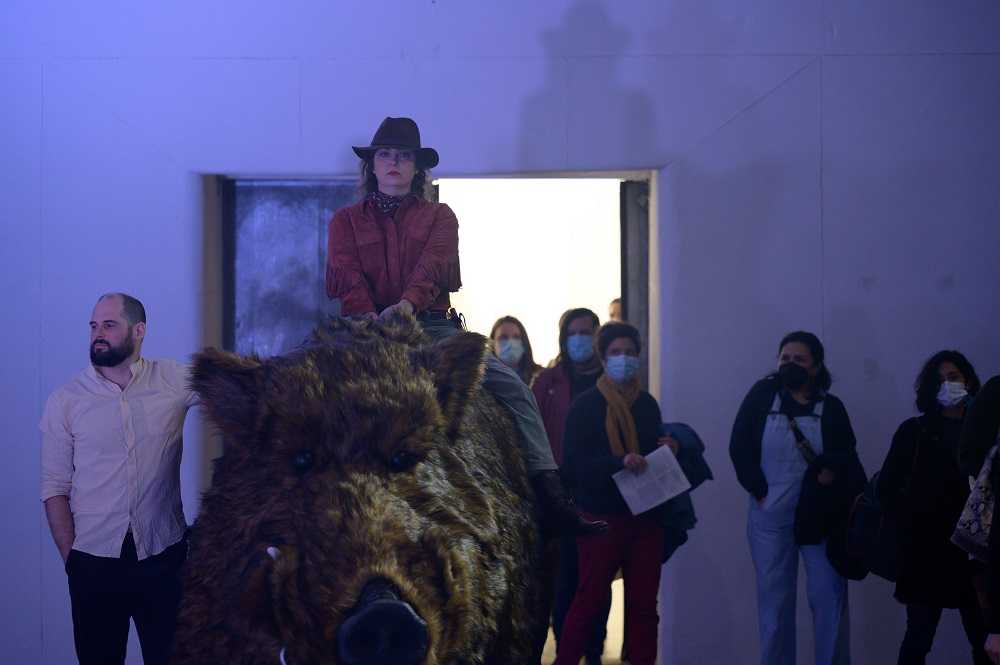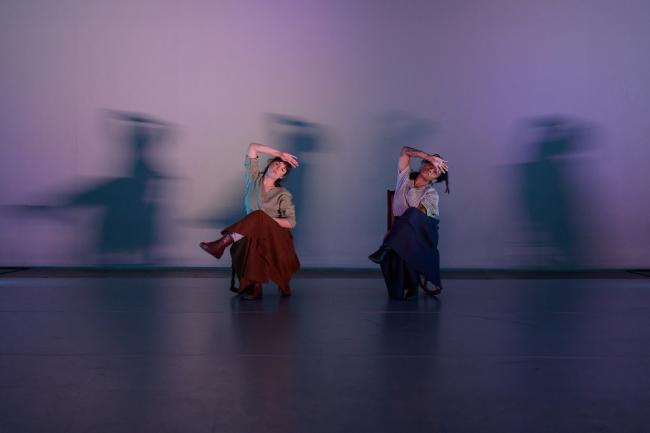Labor Unions Aren’t the Villains and Southerners Don’t Kiss Their Cousins
by Caitlin Green
Theatre Philadelphia and thINKingDANCE continue our partnership, begun in 2018, bringing coverage and new perspectives to Philadelphia’s vibrant theatre scene.
 Photo: Johanna Austin
Photo: Johanna Austin
While perusing the display of West Virginia native coal lumps and red handkerchiefs tabled in the lobby, I heard shouts, grunts and screams from inside the Icebox. “Is everyone okay in there?” questioned a concerned guest. The scuffle died down, doors opened, and we were ushered into the space where Paige Phillips’ The Tale of the Slaughtered Hog, premiered. The work was part of Philadelphia Dance Projects’ mini-festival, “Rural Legacies.”
Inside, it was calm with a lingering tension. First sight: the backside of a massive, brown, hairy hog (sculpture by Evan Dawson) upon which Phillips was mounted. Her gaze scanned the room. Chloe Newton and Celine McBride occupied two rocking chairs positioned center stage. Their expressions were nonchalant yet watchful. Crickets were the soundscape. The audience settled into the hazy precipice of the unknown and lingered there until the two dancers arose together from their seated positions.
Cue banjo.
A duet ensued in perfect unison. The dancers stood momentarily before returning to their seats. Their gestures altered between states of exhaustion, rumination, and vigor. Holding the weight of their heads in their hands, each dancer hunched over their lap, in a daze. There was a sharp switch when their hands swept eye-level, posture erect, while pointing with crisp dexterity in side-by-side synchrony. Their body language teetered from passive to active weight and back with ease. A temporary surrender to gravity brought them to the floor and their body tension unraveled. Catching themselves on hands and knees, they let out a desperate cough before recuperating into their seated, upright position in rocking chairs - all to the tempo of a twangy-stringed tune.
Jeff Evans and Nick Jonczak arrived on stage and took turns telling the legend of the Hatfield and McCoy feud in a rhythmic cadence. We learned of the two Appalachia families who rivaled in West Virginia for decades over a stolen hog during the Coal Wars. Commodification of labor and natural resources, following the industrial revolution, created scarcity and competition. The McCoy’s stolen pig by the wealthier Hatfield’s became a metaphor for the animalistic greed that ultimately drives capitalism. Phillips casually rode the hog across the stage, then dismounted and suddenly began to brutally stab it with a knife! The switch from casual to brutal could represent the dark underbelly of capitalism that’s only revealed once the buy-in has already transpired. Since the onslaught occurred prior to the pig’s symbolism being explained, the violence appeared outrageous and unprecedented.
In a change of tone, dance theater became a comedy club when Phillips performed a stand-up skit and autobiographical account of her upbringing. She invited us to laugh with her as she shared the vulnerabilities that led her to this work. She recalled her mother’s passing, her embarrassment around growing up Southern and poor, and the many stereotypes she’d either need to come to terms with or disprove in order to be taken seriously. Phillips sarcastically reminded us that affinities to square dancing, all-camouflage-everything, and John Denver’s “Take Me Home, Country Roads” as go-to karaoke song may be West Virginia cultural landmarks, but a Southern accent alone shouldn’t indicate innate oblivion, a history of incest, and automatic Trump endorsement! In a reflection of her journey into performance arts, Phillips performed a fun solo number over poppy dance music and wore an unwavering, matter-of-fact grin. The fringe on her tassled jacket did a dance of its own while she chasséd her way into our hearts as “hill-Billy Elliot.”
Later, an interview with former West Virginia coal miners was screened, shedding light on how labor unions fought for viable wages, healthcare, and pension in exchange for the tireless hours spent doing life-threatening work. They were painted as villains in the form of agitators and shunned from the community. A similar form of exploitation and erasure was referenced when Paule Turner Dutchess performed a solo introducing the Battle of Blair Mountain. It was one of the largest uprisings in the States, led by a multiethnic group of miners resulting in policy change for union workers, but it is often left out of history books. Dutchess continued to reinforce the show’s theme of resistance by challenging biases of gender norms and ethnocentricity. He slipped on a pair of knee-high heels; the first read “Black,” and the second, “like Jesus.” Their performance exploded with symbolism that boldly commanded attention and dared to disrupt one-dimensional ways of thinking and being.
In the final act, the cast took us to church and convinced us to join a very West Virginia-style communion (we were given a sip of Mountain Dew and a piece of pepperoni-stuffed bread while singing a song of solidarity). It did create a sense of community and hope toward a future less consumed by capitalism - all in a matter of minutes. I started to wonder if I had joined a cult. I’m kidding, but this experience demonstrated the ease of enticing the behaviors of the masses for a particular cause.
The Tale of the Slaughtered Hog was a theatrical medley that melded together genres including comedy, dance, and documentary to tell the legend of the Hatfield and McCoy feud. In a critique of capitalism, it highlighted the culture, history and experiences of the West Virginia working class, in an endearing and quirky manner, while demanding flexibility and freedom in the framing of this archetype.
The Tale of the Slaughtered Hog, Paige Phillips, Icebox Project Space, March 28-30.
To join the conversation, follow thINKingDANCE and Theatre Philadelphia online and on social media to read, share, and comment.

